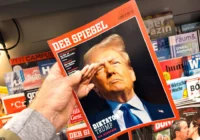This morning it occurred to me that Chad might have some insight into the phenomenon French President Emmanuel Macron recently described as “suivisme,” the pathology of uncritically following someone else’s direction.
“Chad, you surely remember that back in 2019 the Trump administration made the extraordinary decision that a man called Juan Guaidó, who had never been elected or even considered as a presidential candidate, should be recognized as the legitimate president of Venezuela. Donald Trump justified this by claiming the democratically elected President Nicolás Maduro was a dictator who had managed democracy in his favor. After his withdrawal from the Paris climate accords and the Iran deal, Trump had acquired a reputation for making peremptory foreign policy decisions. Astonishingly, the European Union despite having made known its discomfort with Trump’s policies and personality, followed suit, recognizing Guaidó as Venezuela’s president. Two years later, in January 2021, just before the end of Trump’s term, the EU quietly withdrew their recognition of Guaidó. How can we explain the Europeans’ willingness to do something so obviously arbitrary and undemocratic?”
Chad surprised me by immediately resorting to a familiar strategy designed to dismiss probing questions.
“It’s important to note that the issue of recognizing Juan Guaidó as the legitimate president of Venezuela is a complex and multi-faceted one, and opinions on this matter can vary.”
Usually Chad takes some time before reaching the conclusion that there are too many contradictory opinions to take any one of them seriously. This time I had to react.
“Stop, stop! Please, Chad. I understand. No need to continue. Once you’ve trotted out your patented ‘complex and multifaceted,’ there’s no reason to add any other arguments to it. Case closed.”
Chad paused, stared at me for a moment and then insisted on adding this reflection. “The decision by some European nations to recognize Juan Guaidó may have been influenced by pressure from the United States. Historically, the United States has had strong ties with Europe, and there may have been a desire to align with American policy, particularly under the Trump administration.”
The Trump factor
Now the alacrity of Europeans to follow the Trump administration surprised me, so I followed up with this question. “Why would you think the Europeans are ‘particularly’ inclined to follow Trump’s lead? That sounds contradictory to me.”
Chad apologized for giving a wrong impression and clarified by asserting that “the United States has historically been an important ally and partner for many European nations, and there is often a desire to maintain a close relationship and align on key policy issues. Despite concerns and disagreements with certain aspects of the Trump administration’s policies, European nations generally value the transatlantic relationship and may have felt compelled to maintain some level of cooperation or alignment, including in matters related to Venezuela.”
Now we were making some progress. The real question concerns what kind of relationship is implied when one party fells “compelled” to fall in line with another party’s arbitrary policies. This evoked in my mind more recent events and shared my .thought with Chad.
“Would that justify French President Emmanuel Marcron’s recently expressed concern about European nations falling into the role of what he called vassals of the US on the Taiwan situation with China.”
“Yes,” Chad responded, “the concerns expressed by President Emmanuel Macron about European nations potentially becoming vassals of the United States are valid and reflect a broader discussion within Europe regarding strategic autonomy and the balance of power in international relations. Macron, along with other European leaders, has emphasized the need for Europe to assert its own interests and pursue a more independent foreign policy.
Chad then surprised me by another assertion. “European nations, including France, have expressed the view that they should maintain their own strategic interests and make decisions based on their own assessments of geopolitical risks and opportunities.”
“Wait a minute,” I exclaimed. “I admit that France has insisted on strategic autonomy at least since De Gaulle, and maybe Germany has at times shown tendencies in that direction. But I don’t see any other European countries taking that stance, especially now that they have aligned behind the US as the leader of NATO in confronting Russia, despite the damage not just to their sense of autonomy but also their economy. Germany in particular has abjectly accepted policieis and acts by the US that have had the effective of crippling its economy.”
NATO’s strategic ambiguity
Chad’s response was predictable.
“It is important to note that European countries also value the transatlantic relationship and recognize the benefits of cooperation with the United States, particularly within the NATO framework. NATO serves as a vital alliance for collective defense and has played a crucial role in deterring potential security threats, including from Russia.”
“As Trump himself pointed out,” I retorted, “Europeans have become complacent with a situation in which the US makes the essential investment in their defense. But that has impeded even the hope of autonomy. And now they are enduring the consequences of Washington’s aggressive policy aimed at weakening Russia. This has produced a profound feeling of malaise. Although, no one seems willing to rock the boat for the moment, the economic consequences will eventually take their toll on European solidarity. I know you don’t know the answer to this, but, given your understanding of past historical trends, at one point will either the governments change course or the people revolt? Or will they only change course if the people revolt?”
I knew Chad would both acknowledge my point and find a way of avoiding a direct answer.
“The economic consequences of certain policies or actions, as you mentioned, can certainly impact European solidarity and influence public sentiment. Economic factors have historically played a role in shaping political landscapes and driving changes in policies. However, it is important to remember that political decisions are multifaceted, and a range of factors, including geopolitical considerations and national interests, come into play.”
I should have known that this would lead to the inevitable “multifaceted” defense strategy. If there’s one thing Chad will always teach us, it’s that whenever are crucial decision needs to be made, those who see no interest in challenging the status quo will always have a sledge hammer response that is specifically intended to sound delicate and nuanced.
I couldn’t, however, disagree with Chad’s final conclusion.
“Ultimately, the future course of European governments and the responses of the people will depend on a complex interplay of political, economic, and social dynamics.”
It’s always about interplay, a concept far more interesting, dynamic and instructive than simply noticing that issues tend to be “complex and multifaceted.” The very idea of interplay contains the concept of play, which means that something will have to give and history will see an outcome. That outcome will produce another instance of interplay.
In other words, Francis Fukuyama was wrong. There is no end to history. The vassals can continue to hope they will one day be free.
*[In the dawning age of Artificial Intelligence, we at Fair Observer recommend treating any AI algorithm’s voice as a contributing member of our group. As we do with family members, colleagues or our circle of friends, we quickly learn to profit from their talents and, at the same time, appreciate the social and intellectual limits of their personalities. This enables a feeling of camaraderie and constructive exchange to develop spontaneously and freely. For more about how we initially welcomed Chad to our breakfast table, click here.]
The views expressed in this article are the author’s own and do not necessarily reflect Fair Observer’s editorial policy.
Support Fair Observer
We rely on your support for our independence, diversity and quality.
For more than 10 years, Fair Observer has been free, fair and independent. No billionaire owns us, no advertisers control us. We are a reader-supported nonprofit. Unlike many other publications, we keep our content free for readers regardless of where they live or whether they can afford to pay. We have no paywalls and no ads.
In the post-truth era of fake news, echo chambers and filter bubbles, we publish a plurality of perspectives from around the world. Anyone can publish with us, but everyone goes through a rigorous editorial process. So, you get fact-checked, well-reasoned content instead of noise.
We publish 2,500+ voices from 90+ countries. We also conduct education and training programs
on subjects ranging from digital media and journalism to writing and critical thinking. This
doesn’t come cheap. Servers, editors, trainers and web developers cost
money.
Please consider supporting us on a regular basis as a recurring donor or a
sustaining member.
Will you support FO’s journalism?
We rely on your support for our independence, diversity and quality.







Comment